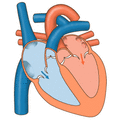Cardiology facts for kids
Cardiology is a special part of medicine that studies the heart and blood vessels. It helps people with problems related to these important body parts. Doctors who work in this field are called cardiologists.
Cardiologists are different from cardiac surgeons. Cardiologists are medical doctors who diagnose and treat heart conditions using medicines or procedures that don't involve major surgery. Cardiac surgeons are doctors who perform operations on the heart and blood vessels.
Contents
What is Cardiology?
Cardiology comes from two Greek words: kardia, meaning "heart," and logia, meaning "study of." So, cardiology is literally the "study of the heart." This field of medicine looks at how the heart works and what can go wrong with it. It also studies the blood vessels, which are like tubes that carry blood all over your body.
What Do Cardiologists Do?
Cardiologists are experts in the heart. They help people who have heart problems or are at risk of developing them.
- They diagnose heart conditions using tests like electrocardiograms (ECGs), echocardiography (ultrasound of the heart), and stress tests.
- They treat conditions such as high blood pressure, heart attacks, heart failure, and problems with heart rhythm.
- They also advise people on how to keep their heart healthy through diet, exercise, and lifestyle changes.
- Cardiologists often work with other doctors to give the best care.
What Do Cardiac Surgeons Do?
Cardiac surgeons are highly trained doctors who perform operations on the heart and major blood vessels.
- They might do surgery to fix problems with heart valves.
- They can repair holes in the heart or correct issues present since birth.
- They also perform coronary artery bypass graft (CABG) surgery, which helps improve blood flow to the heart.
- Cardiac surgeons work closely with cardiologists to decide if surgery is the best option for a patient.
Common Heart Conditions
Many different conditions can affect the heart and blood vessels. Cardiologists treat a wide range of these problems.
High Blood Pressure
High blood pressure, also known as hypertension, means the force of blood against your artery walls is too high. Over time, this can damage blood vessels and lead to serious heart problems. Cardiologists help manage this condition with medicines and lifestyle changes.
Heart Attacks
A heart attack happens when blood flow to a part of the heart is blocked. This can damage heart muscle. Cardiologists work quickly to restore blood flow and help patients recover.
Heart Failure
Heart failure means the heart isn't pumping blood as well as it should. It doesn't mean the heart has stopped working, but that it needs help to pump more efficiently. Cardiologists provide treatments to help the heart work better.
Heart Rhythm Problems
The heart has an electrical system that controls its beat. Sometimes, this system doesn't work right, causing the heart to beat too fast, too slow, or irregularly. This is called an arrhythmia. Cardiologists can use medicines or special procedures to correct these rhythm problems.
How to Keep Your Heart Healthy
Taking care of your heart is very important, even when you are young. Here are some tips:
- Eat healthy food: Choose lots of fruits, vegetables, and whole grains. Try to eat less sugary drinks and unhealthy fats.
- Be active: Get at least 60 minutes of physical activity most days of the week. This could be playing sports, riding your bike, or dancing.
- Get enough sleep: Aim for 8-10 hours of sleep each night.
- Manage stress: Find healthy ways to deal with stress, like talking to friends, listening to music, or spending time in nature.
- Avoid smoking: Smoking is very bad for your heart and blood vessels.
By making healthy choices now, you can help keep your heart strong for many years to come!
Images for kids
See also
 In Spanish: Cardiología para niños
In Spanish: Cardiología para niños
 | James Van Der Zee |
 | Alma Thomas |
 | Ellis Wilson |
 | Margaret Taylor-Burroughs |



